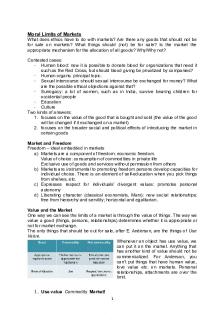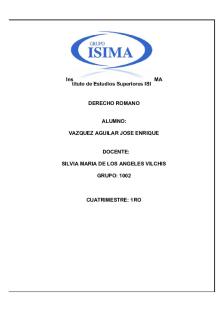Theories of Moral Status PDF

| Title | Theories of Moral Status |
|---|---|
| Course | Biomedicine and Disease |
| Institution | Oakland University |
| Pages | 2 |
| File Size | 64.1 KB |
| File Type | |
| Total Downloads | 17 |
| Total Views | 164 |
Summary
Professor Banes-Berceli - Biomedicine and Disease Winter 2017 semester - lecture 3 notes on the theories of moral status ...
Description
Biomedicine and Disease (BIO 499) - Lecture 3 Notes - Medical Ethics - Theories of Moral Status
5 Theories: 1. 2. 3. 4. 5.
Human properties Cognitive properties Moral agency Sentience Relationships
Theory based on human properties: • All humans have status and only humans have it • Theory states human life begins at fertilization and once life begins all humans have full moral rights and status ◦ Same as adult human beings Theory based on cognitive properties: • Cognition = awareness -- perception, memory, understanding, thinking • Self awareness (awareness of time -- past and future) • Freedom to act and capacity to engage in purposeful actions • • •
Ability to give and appreciate reasons for acting Capacity to communicate with language ◦ Big deal bc not all groups can communicate Rationality and high order volition
Theory based on moral agency: • Moral status derived from the capacity to act as a moral agent • 2 conditions need to be met: ◦ Individual capable of making moral judgments about right and wrong actions of theirs ◦
Individual has motives that can be judged morally
Theory based on sentience: • Sentience = consciousness in the form of feeling ◦ Especially capacity to feel pain and pleasure • Humans and non animals have properties that aren't cognitive or moral properties but should count towards moral status •
Central line of argument = pain is evil and bad, pleasure is good ◦ To cause pain to any entity is to harm it and this is wrong
Theory based on relationships: • Relationships between parties accounts for moral status •
◦ Primarily relationships that estblish roles and obligations Example: parent-child, doctor-patient ◦ Have obligations that are specific to the roles...
Similar Free PDFs

Theories of Moral Status
- 2 Pages

Case Study on Moral Status
- 5 Pages

Moral Limits of Markets
- 4 Pages

Legal status of dead person
- 3 Pages

Theories of Human Communication
- 493 Pages

Theories of development
- 36 Pages

Comparison of Family Theories
- 5 Pages

Theories of sociology essay
- 4 Pages

Theories-of-Punishment
- 6 Pages

Theories of Personality - Adler
- 130 Pages

Theories of Justice
- 14 Pages

Theories of Learning
- 40 Pages

Theories of Personality Outline
- 52 Pages
Popular Institutions
- Tinajero National High School - Annex
- Politeknik Caltex Riau
- Yokohama City University
- SGT University
- University of Al-Qadisiyah
- Divine Word College of Vigan
- Techniek College Rotterdam
- Universidade de Santiago
- Universiti Teknologi MARA Cawangan Johor Kampus Pasir Gudang
- Poltekkes Kemenkes Yogyakarta
- Baguio City National High School
- Colegio san marcos
- preparatoria uno
- Centro de Bachillerato Tecnológico Industrial y de Servicios No. 107
- Dalian Maritime University
- Quang Trung Secondary School
- Colegio Tecnológico en Informática
- Corporación Regional de Educación Superior
- Grupo CEDVA
- Dar Al Uloom University
- Centro de Estudios Preuniversitarios de la Universidad Nacional de Ingeniería
- 上智大学
- Aakash International School, Nuna Majara
- San Felipe Neri Catholic School
- Kang Chiao International School - New Taipei City
- Misamis Occidental National High School
- Institución Educativa Escuela Normal Juan Ladrilleros
- Kolehiyo ng Pantukan
- Batanes State College
- Instituto Continental
- Sekolah Menengah Kejuruan Kesehatan Kaltara (Tarakan)
- Colegio de La Inmaculada Concepcion - Cebu


